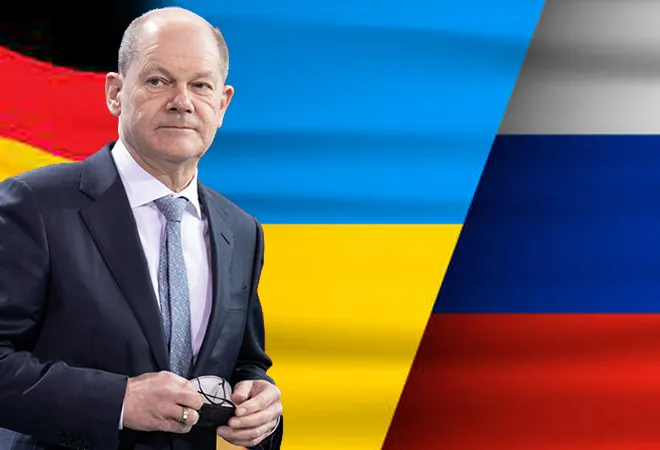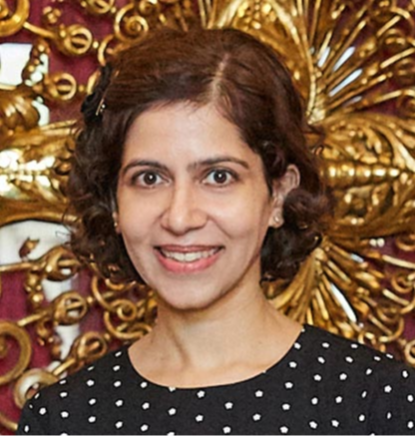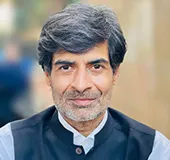
The talk of values is not new to German foreign policy-makers. But the Russian invasion on Ukraine seems to have finally led Germany to walk the walk. The last week has been both frenzied and path-breaking in German politics.
On 22 February, Germany’s Chancellor, Olaf Scholz—a Social Democrat from Hamburg—called for a halt to Nord Stream 2, in response to Russian President, Vladimir Putin’s, provocations in Eastern Ukraine. This was dramatic at several levels: Germany’s energy dependence on Russia had tended to make some politicians—including Scholz’s predecessor, Angela Merkel (a Christian Democrat)—wary of pulling the plug on the pipeline project. Scholz deserves even more credit for having made this break with Germany’s Russia policy in the context of party politics: The Social Democrats had come under critique in the past for being too soft on Russia (
Russlandversteher).
Germany’s difficult past had led it to ban the export of weapons to conflict-zones; in keeping with this practice, the country had blocked Estonia from sending arms to Ukraine last month.
Since the outbreak of war in Ukraine on 24 February, Olaf Scholz has taken three further remarkable steps. First, after some hesitation, he has agreed to the inclusion of a ban on SWIFT transactions with Russia. This is a strong and costly signal to send to Russia as it will also have financial implications for Germany. Second, Germany’s difficult past had led it to ban the export of weapons to conflict-zones; in keeping with this practice, the country had blocked Estonia from sending arms to Ukraine last month. Olaf Scholz engineered an unprecedented shift. In a stirring speech at a special session of the German Parliament on 27 February, Scholz stated that Germany, by supporting Ukraine, will stand on the side of Europe, democracy, and the “
the right side of history”. Amongst the concrete measures he outlined, sending military supplies to Ukraine was key: “
Russian invasion marks a turning point. It is our duty to support Ukraine to the best of our ability in defending against Putin’s invading army”. Germany will now be supplying anti-tank weapons and Stinger missiles to Ukraine. And third, just as significant is Germany’s announcement to increase its
NATO defence spending, thereby signaling the emergence of Germany as a security actor.
In a country where deliberative democracy is exalted (sometimes to a point where it amounts to being a strategy to doing nothing or muddling through), and the burden of history is high, the swift turn towards taking greater responsibility through action cannot be underestimated. Scholz’s leadership has been critical to this development, though he is undoubtedly helped by his coalition partners in the Green Party, who have come to power on a platform of principles and values. Germany’s proactive role is invigorating for us to observe, and is perhaps also serving as a catalyst for the European Union:
Witness the unprecedented decision by the EU to purchase weapons for Ukraine.
One could still take issue with the timing of all this: It would have indeed been better to signal such resolve to Putin
before his attack on Ukraine, thereby, deterring war in the first place. But at a time when Germany seems to be finally walking the walk of values, it is time to not look behind, but fare forward.
Germany’s proactive role is invigorating for us to observe, and is perhaps also serving as a catalyst for the European Union: Witness the unprecedented decision by the EU to purchase weapons for Ukraine.
It is clear that Scholz has understood the importance of hard power, in a way that his predecessors had not. As a dedicated European, he also knows that the Putin’s aggression towards Ukraine is a threat to European security as a whole. The question remains though, will he be able to extend his gaze to the global stage, and exercise much-needed leadership there? Putin is not the only authoritarian with grand designs in his neighbourhood; President Xi has been displaying similar adventurism towards Taiwan. The Ukraine crisis has brought these two players even closer, thus far. Will Scholz be the Chancellor to break out of the European platitudes of “partner, competitor, and rival” and finally call out China, just the way he has with Russia? As Mayor of Hamburg, Scholz was able to successfully attract Chinese investment to his city. As the Chancellor of Germany, he now has the onerous task of building a governance architecture that will secure the continent—and like-minded, democratic partners—from Chinese expansionism.
The views expressed above belong to the author(s). ORF research and analyses now available on Telegram! Click here to access our curated content — blogs, longforms and interviews.



 The talk of values is not new to German foreign policy-makers. But the Russian invasion on Ukraine seems to have finally led Germany to walk the walk. The last week has been both frenzied and path-breaking in German politics.
On 22 February, Germany’s Chancellor, Olaf Scholz—a Social Democrat from Hamburg—called for a halt to Nord Stream 2, in response to Russian President, Vladimir Putin’s, provocations in Eastern Ukraine. This was dramatic at several levels: Germany’s energy dependence on Russia had tended to make some politicians—including Scholz’s predecessor, Angela Merkel (a Christian Democrat)—wary of pulling the plug on the pipeline project. Scholz deserves even more credit for having made this break with Germany’s Russia policy in the context of party politics: The Social Democrats had come under critique in the past for being too soft on Russia (Russlandversteher).
The talk of values is not new to German foreign policy-makers. But the Russian invasion on Ukraine seems to have finally led Germany to walk the walk. The last week has been both frenzied and path-breaking in German politics.
On 22 February, Germany’s Chancellor, Olaf Scholz—a Social Democrat from Hamburg—called for a halt to Nord Stream 2, in response to Russian President, Vladimir Putin’s, provocations in Eastern Ukraine. This was dramatic at several levels: Germany’s energy dependence on Russia had tended to make some politicians—including Scholz’s predecessor, Angela Merkel (a Christian Democrat)—wary of pulling the plug on the pipeline project. Scholz deserves even more credit for having made this break with Germany’s Russia policy in the context of party politics: The Social Democrats had come under critique in the past for being too soft on Russia (Russlandversteher).
 PREV
PREV



